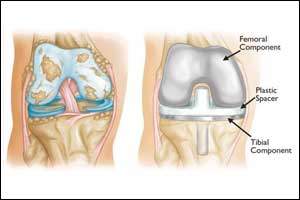- Home
- Editorial
- News
- Practice Guidelines
- Anesthesiology Guidelines
- Cancer Guidelines
- Cardiac Sciences Guidelines
- Critical Care Guidelines
- Dentistry Guidelines
- Dermatology Guidelines
- Diabetes and Endo Guidelines
- Diagnostics Guidelines
- ENT Guidelines
- Featured Practice Guidelines
- Gastroenterology Guidelines
- Geriatrics Guidelines
- Medicine Guidelines
- Nephrology Guidelines
- Neurosciences Guidelines
- Obs and Gynae Guidelines
- Ophthalmology Guidelines
- Orthopaedics Guidelines
- Paediatrics Guidelines
- Psychiatry Guidelines
- Pulmonology Guidelines
- Radiology Guidelines
- Surgery Guidelines
- Urology Guidelines
Rivaroxaban monotherapy most effective for preventing DVT after total knee replacement

Rivaroxaban monotherapy is the most effective strategy for preventing deep venous thrombosis after total knee replacement revealed a study published in the Lancet Hematology.
Deep vein thrombosis (DVT) is a serious complication after total knee arthroplasty (TKA). Provision of prophylaxis to patients admitted for elective total knee replacement surgery has been proposed as an effective strategy to reduce the incidence of venous thromboembolism. The present study aimed to assess the relative efficacy and safety of all available prophylaxis strategies in this setting.
The authors of the study did a systematic review and Bayesian network meta-analyses of randomized controlled trials to assess the relative efficacy and safety of venous thromboembolism prophylaxis strategies and to populate an economic model that assessed the cost-effectiveness of these strategies and informed the updated National Institute for Health and Care Excellence (NICE) guideline recommendations for patients undergoing elective total knee replacement surgery.
The Cochrane Library (CENTRAL), Embase, and Medline were last searched on June 19, 2017, with key terms relating to the population (venous thromboembolism and total knee replacement) and the interventions compared, including available pharmacological and mechanical interventions. Outcomes of interest were deep vein thrombosis (symptomatic and asymptomatic), pulmonary embolism, and major bleeding. Risk of bias was assessed, and relevant data extracted from the included randomized controlled trials for the network meta-analyses. Relative risks (RR; with 95% credible intervals [95% CrI]) compared to no prophylaxis, median ranks (with 95% CrI), and the probability of being the best intervention were calculated. The study was done in accordance with PRISMA guidelines.
Key findings
For reference, click on the link
DOI:https://doi.org/10.1016/S2352-3026(19)30155-3
Deep vein thrombosis (DVT) is a serious complication after total knee arthroplasty (TKA). Provision of prophylaxis to patients admitted for elective total knee replacement surgery has been proposed as an effective strategy to reduce the incidence of venous thromboembolism. The present study aimed to assess the relative efficacy and safety of all available prophylaxis strategies in this setting.
The authors of the study did a systematic review and Bayesian network meta-analyses of randomized controlled trials to assess the relative efficacy and safety of venous thromboembolism prophylaxis strategies and to populate an economic model that assessed the cost-effectiveness of these strategies and informed the updated National Institute for Health and Care Excellence (NICE) guideline recommendations for patients undergoing elective total knee replacement surgery.
The Cochrane Library (CENTRAL), Embase, and Medline were last searched on June 19, 2017, with key terms relating to the population (venous thromboembolism and total knee replacement) and the interventions compared, including available pharmacological and mechanical interventions. Outcomes of interest were deep vein thrombosis (symptomatic and asymptomatic), pulmonary embolism, and major bleeding. Risk of bias was assessed, and relevant data extracted from the included randomized controlled trials for the network meta-analyses. Relative risks (RR; with 95% credible intervals [95% CrI]) compared to no prophylaxis, median ranks (with 95% CrI), and the probability of being the best intervention were calculated. The study was done in accordance with PRISMA guidelines.
Key findings
- 25 randomized controlled trials were included in the network meta-analyses. 23 trials were included in the deep vein thrombosis network, 12 in the pulmonary embolism network, and 19 in the major bleeding network.
- Risk of bias ranged from very low to high. Rivaroxaban ranked first for prevention of deep vein thrombosis.
- Low molecular weight heparin ranked first in the pulmonary embolism network and LMWH ranked first in the major bleeding network, but the results for pulmonary embolism and major bleeding are highly uncertain.
"Single prophylaxis strategies are more effective in prevention of deep vein thrombosis in the elective total knee replacement population than combination strategies, with rivaroxaban being the most effective. The results of the pulmonary embolism and major bleeding meta-analyses are uncertain and no clear conclusion can be made other than what is biologically plausible (eg, that no prophylaxis and mechanical prophylaxis strategies should have the lowest risk of major bleeding)." the authors conclude.
For reference, click on the link
DOI:https://doi.org/10.1016/S2352-3026(19)30155-3
Deep Venous ThrombosisguidelineKnee Arthroplastyknee replacementknee replacement surgeryLancetMedical newsmedical news indiaNational Institute for Health and Care ExcellenceNICEprophylaxisrandomized controlled trialRivaroxabanrivaroxaban monotherapythromboembolismtotal knee arthroplastyTotal Knee Replacement
Next Story
NO DATA FOUND

Disclaimer: This site is primarily intended for healthcare professionals. Any content/information on this website does not replace the advice of medical and/or health professionals and should not be construed as medical/diagnostic advice/endorsement or prescription. Use of this site is subject to our terms of use, privacy policy, advertisement policy. © 2020 Minerva Medical Treatment Pvt Ltd